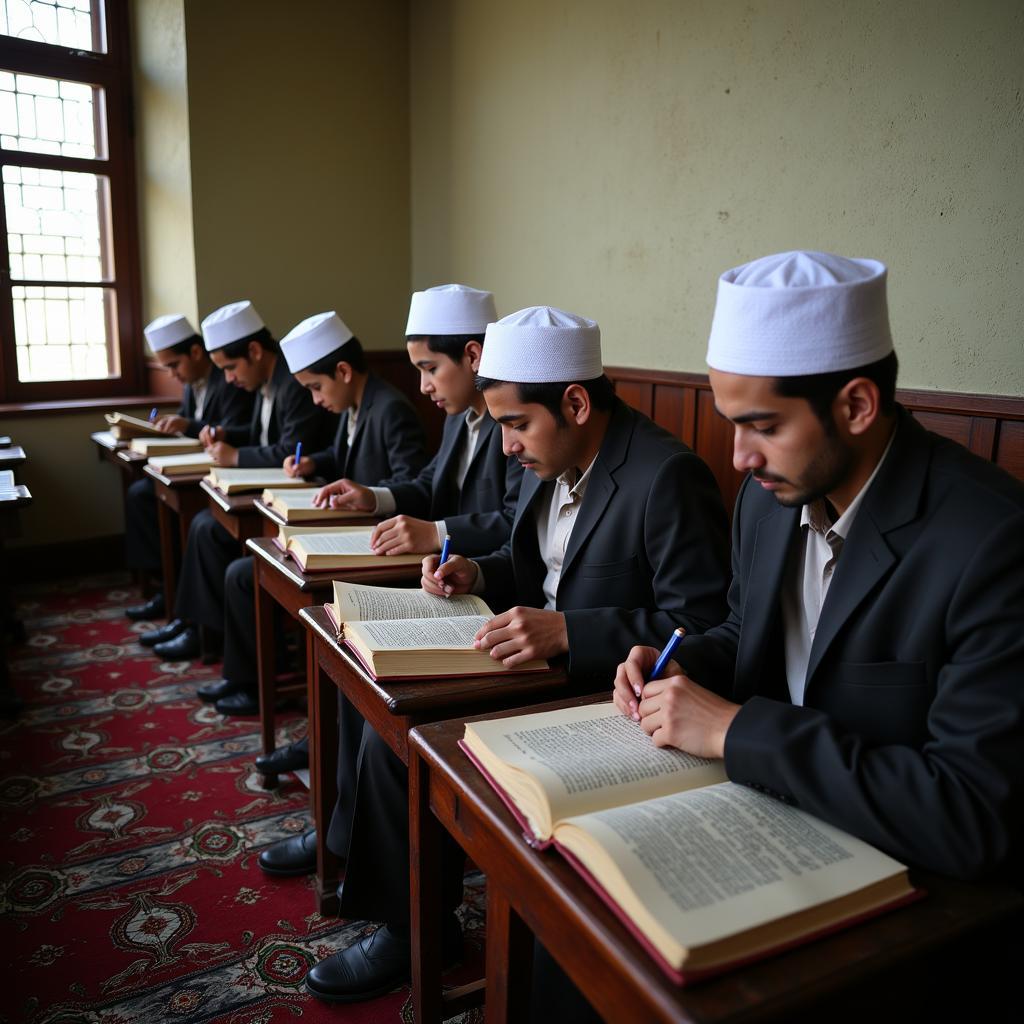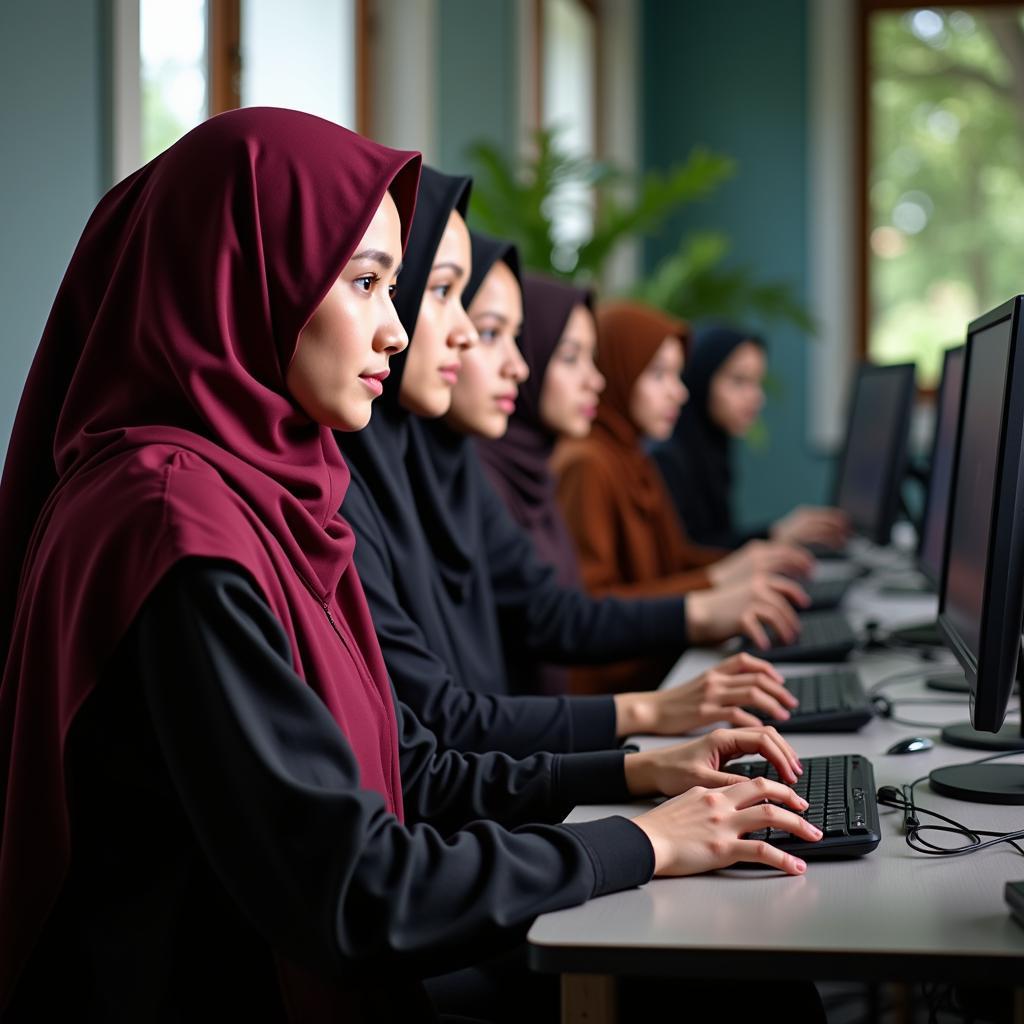Madrasa Education In Pakistan has been a subject of debate and reform for decades. This system of religious education plays a significant role in the lives of millions of Pakistani children, shaping their worldview and influencing the country’s social fabric. Understanding its complexities is crucial for comprehending Pakistan’s educational landscape.
The History and Evolution of Madrasa Education
The history of madrasas in the Indian subcontinent, and consequently Pakistan, is deeply intertwined with the spread of Islam. Initially, madrasas were centers of learning, not just for religious studies but also for subjects like mathematics, astronomy, and philosophy. Over time, however, the focus shifted primarily to religious instruction. The British colonial era saw a decline in traditional madrasa patronage, leading to a period of stagnation. Post-independence Pakistan witnessed a resurgence of madrasas, often filling the gaps left by a struggling public education system, particularly in rural areas.
Different Types of Madrasas
It’s essential to recognize that not all madrasas are the same. They can be broadly categorized into several types, each with its own curriculum and approach:
- Darul Uloom: These are the most common type, focusing primarily on Islamic jurisprudence, Quranic studies, and Hadith.
- Darul Hadees: These specialize in the study of Hadith, the sayings and traditions of the Prophet Muhammad.
- Darul Tafseer: These concentrate on the interpretation and exegesis of the Quran.
These different types of madrasas cater to diverse educational needs within the Islamic tradition.
 Pakistani Madrasa Students Engaged in Religious Studies
Pakistani Madrasa Students Engaged in Religious Studies
Challenges and Reforms in Madrasa Education
Madrasa education in Pakistan faces several challenges, including:
- Curriculum relevance: The traditional curriculum often lacks emphasis on modern subjects like science, mathematics, and English, limiting graduates’ employment opportunities.
- Quality control: The lack of standardized oversight and regulation has led to disparities in the quality of education offered across different madrasas.
- Integration with mainstream education: Bridging the gap between madrasa education and the mainstream system remains a significant hurdle.
Recognizing these issues, various reforms have been initiated over the years, aiming to modernize the madrasa curriculum and integrate it with the national education system. These reforms seek to equip madrasa graduates with the skills needed to compete in the 21st-century job market.
The Role of Madrasas in Pakistani Society
Madrasas play a multifaceted role in Pakistani society. They provide education to a large segment of the population, particularly those from marginalized communities. They also serve as important community centers, often providing social welfare services. However, concerns have been raised about some madrasas promoting extremist ideologies. Addressing this challenge requires a nuanced approach that balances the need for security with the importance of religious freedom.
The Future of Madrasa Education
The future of madrasa education in Pakistan hinges on its ability to adapt to the changing needs of the country. Integrating modern subjects, improving teacher training, and strengthening oversight are critical for ensuring that madrasas can contribute positively to Pakistan’s development. This includes fostering critical thinking and tolerance, empowering madrasa graduates to become productive members of society.
What is the future of madrasa education?
The future depends on ongoing reforms and integration with the modern world.
“Madrasas must embrace change to equip students for the future,” says Dr. Ayesha Khan, a leading education expert in Pakistan. “This means incorporating modern subjects and fostering critical thinking skills.”
 Female Madrasa Students Learning Computer Skills
Female Madrasa Students Learning Computer Skills
Conclusion
Madrasa education in Pakistan is at a crossroads. While it has a long and rich history, it faces significant challenges in the modern era. By addressing these challenges through comprehensive reforms and a commitment to quality education, madrasas can continue to play a vital role in Pakistan’s future, empowering future generations and fostering a more inclusive and prosperous society.
FAQ
- What is the main purpose of a madrasa? To provide Islamic religious education.
- Are all madrasas the same? No, there are different types with varying curricula.
- What are some challenges facing madrasas? Curriculum relevance, quality control, and integration with mainstream education.
- What reforms are being implemented? Modernizing the curriculum and improving teacher training.
- What is the future of madrasa education? It depends on ongoing reforms and adaptation to modern needs.
- What are the different types of madrasas? Darul Uloom, Darul Hadees, and Darul Tafseer are among the most common.
- How can I support madrasa education in Pakistan? Research reputable organizations working to improve madrasa education and consider supporting their efforts.
Need further assistance? Contact us at Phone: +923337849799, Email: [email protected], or visit our office at Dera Ghazi Khan Rd, Rakhni, Barkhan, Balochistan, Pakistan. Our customer service team is available 24/7.